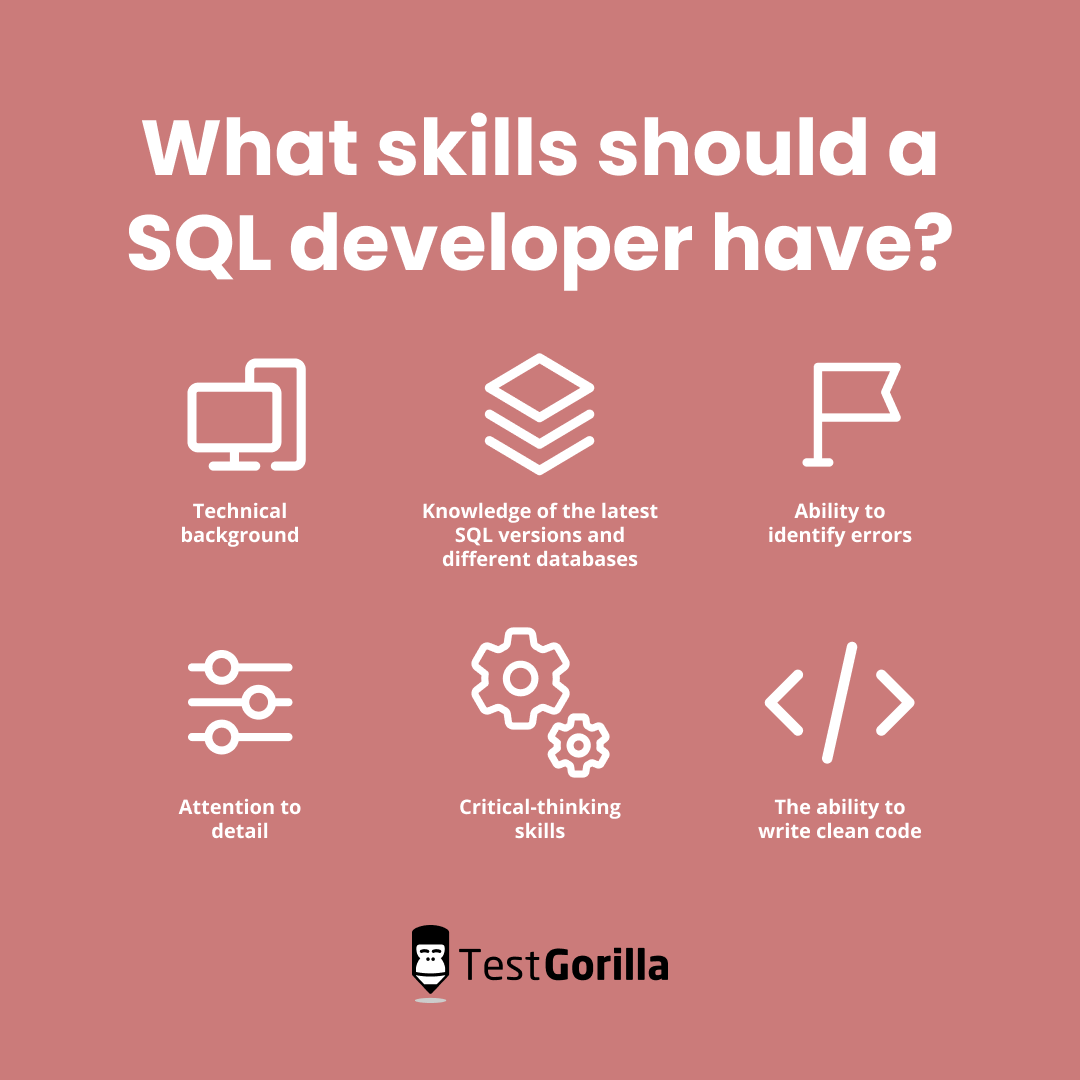Nowadays, data is everything. Regardless of the size of your company, you’re likely collecting, storing, and managing data on a daily basis. That’s why hiring an excellent SQL developer with the proper know-how is essential for your firm’s success.
SQL (pronounced “ess-que-ell,” although some people pronounce it “sequel”), or Structured Query Language, is a programming language designed to process and maintain data.
SQL developers use it to store, retrieve, and manipulate data saved in relational databases. There is a high demand for skilled SQL developers, and many businesses will give an arm and a leg to get the best.
As your organization’s hiring manager or recruiter, it’s your job to find and hire top SQL developers before they are snatched up by your competitors. If you’re not aware of what skills to look for when searching for SQL developers, then this guide is for you.
We’ve created a SQLite querying online test that will aid you in finding the best SQL developers out there.
With this test, you can evaluate senior back-end developers’ practical knowledge and ability to create medium-complexity databases.
With the above in mind, this article will go into more detail about what SQL developers do and what skills you should be looking for when hiring one.
We’ll also give you a step-by-step guide on how to carry out the hiring process.
What does a SQL developer do?
As mentioned, a SQL developer is responsible for creating and managing SQL databases. They design functions and SQL tables that store data.
SQL is used in different database software systems, such as Oracle, MySQL, T-SQL, Microsoft SQL Server Management Studio, and SQL Server.
The primary tasks of a SQL developer are to:
Create and maintain databases
Ensure databases are operational
Protect data security
Retrieve and extract data
Identify and proactively solve problems concerning the database
Work closely with business owners to design and develop databases needed by the organization
Depending on the seniority and location of the SQL developer you hire, their skills and pay may differ. In the US, SQL developers’ salaries range from $52,000 to $109,000.
Of course, they need to have certain skills to justify their high pay grade.
What skills should a SQL developer have?
It’s important to determine whether a SQL developer candidate has the necessary skills and experience.
The following are some of the skills you should be looking for:
1. Technical background
When hiring a SQL developer, their technical background is the most important area you should pay attention to. Even though skills can be learned on the job, there are still some prerequisites that candidates need to meet. Your SQL developer should have the following technical expertise:
Proven SQL design skills
Knowledge of database security
Knowledge of cloud services
Familiarity with the different database software systems
A good grasp of crucial data types and functions
2. Ability to identify errors
SQL developers need to be able to identify errors since they work with databases and big data. It’s not unusual for code to break, and it is the SQL developer’s job to quickly find and fix the problem. Your hire should have a proven track record of problem solving.
3. Knowledge of the latest SQL versions and different databases
As mentioned, knowledge of SQL systems is an important asset for every SQL developer. If they have proficiency in systems that use SQL as a coding language, they should be able to quickly start working with the systems your business uses.
On the other hand, if you hire someone without the right knowledge, they will waste time and resources trying to use unfamiliar systems.
4. Attention to detail
This is a core skill for any programmer who processes a lot of information and needs to pay attention to small details. You can use TestGorilla’s attention to textual detail test to assess candidates’ ability to focus on these tiny details and catch errors and inconsistencies.
5. Critical-thinking skills
It is vital for SQL developers to evaluate information accurately and make sound judgments based on these assessments. TestGorilla can help you assess your candidates’ critical-thinking skills by testing their ability to use deductive and inductive reasoning, recognize assumptions, and understand cause-and-effect relationships.
6. The ability to write clean code
Writing clean code is an essential skill for a SQL developer. Building applications that run efficiently and that other developers can easily understand will save your company valuable time and resources. The ability to create clean code is the hallmark of every good software engineer.
TestGorilla can help you evaluate candidates’ ability to write clean code by testing their knowledge of design principles and their code’s readability and simplicity.
The best insights on HR and recruitment, delivered to your inbox.
Biweekly updates. No spam. Unsubscribe any time.
How to hire a SQL developer: a step-by-step guide
This 10-step guide will walk you through how to hire a skilled SQL developer by using skills assessments and interviews to determine whether they’re qualified to join your company.
1. Define your organization’s needs
The first step to take when creating your hiring process is to define your company’s needs. You need to ask yourself why you need a SQL developer, what they will do, and if you need only one or multiple developers. These questions will enable you to write a better job description and attract the right candidates.
2. Determine the role’s requirements
In this step, list the necessary qualifications, the skills and experience a candidate requires, and any other requirements necessary for the role. Again, you will include this information in the job description.
3. Create and post a job ad
Once you’re ready with the job requirements, create an ad and post it on your website, all your social media channels, and relevant job boards. The more places you post the ad to, the higher the chances you’ll get a large pool of talent to choose from.
4. Create a skills assessment
As soon as you’ve started collecting applications, you can start to assess candidates’ skills. With TestGorilla, you can create a skills assessment that includes up to five tests, giving you a comprehensive view of your applicants’ abilities.
You can use the MySQL test and SQLite test to evaluate SQL developers’ technical skills. It’s also a good idea to include tests to assess their cognitive abilities, personality, and culture add. Take a look through TestGorilla’s test library to find the right tests for your open role.
5. Invite applicants to take the skills assessment
When you’ve finished preparing your assessment, you can invite candidates to complete it. You can rest assured that everyone will get equal time to finish the assessment and that all our tests use anti-cheating measures to ensure the validity of the results.
6. Analyze the test results
Once your candidates complete the assessment, it’s time for you to analyze the results. TestGorilla’s test results are simple to interpret.
You can see candidates’ scores on each test and how long they took to complete it. For coding questions, you can even run back the timeline and see how they built the code in real time.
Interpreting the results is easy – you just compare candidates’ scores and the time it took them to finish writing the code to determine which developer has the best skills.
7. Shortlist candidates and invite them for an interview
After the assessment, you may be left with a few candidates who performed well. At this stage, you can start your interviewing process.
If you still have too many candidates, you can begin with telephone interviews to trim down the competition even further. Once you’ve done that, you can move on to face-to-face interviews. During the interviews, ask specific SQL-related questions to further evaluate the candidates’ knowledge.
Even if you have no understanding of SQL, you can still find useful SQL and SQL Server interview questions and answers to ask in interviews. Alternatively, you can ask some of your firm’s current developers to write questions for you. Even if they’re not SQL developers, they’ll likely still have some knowledge of what to ask a candidate for a programming job.
8. Make a hiring decision
Once you’ve collected all the information from the assessment and the telephone and face-to-face interviews, it’s time to decide which candidate you want to hire as your SQL developer. Take your time here – they need to be a good culture add, or else you’ll have to go through the whole process again soon.
9. Inform unsuccessful candidates
It is a good practice to inform unsuccessful candidates that they were not chosen for the role and provide them with feedback. This will boost your organization’s credibility as a workplace that communicates with its applicants, even those who didn’t make the cut, thereby enhancing the candidate experience.
It’s good to keep your doors open because you never know if some candidates may come back after a few years and apply for a job position at your business again. You want to be known as a good employer to attract more talent in the future.
10. Extend an offer to top applicant
Finally, you can extend an offer to your top candidate. At this point, you and the developer can renegotiate or confirm the salary, perks, and expectations for the role.
Hiring a SQL developer is easy when you do it the right way
As discussed in this article, hiring a SQL developer doesn’t need to be a daunting task if you know how to do it properly.
SQL developers are responsible for creating and maintaining your company’s databases. Hiring a candidate with sufficient knowledge and skills is vital if you want to save time and money in the long run.
Enhance your hiring process by using skills assessments to sift through the many candidates who apply for your open role.
By following our guide and using TestGorilla’s online SQLite test, you’ll find the best applicant for your business in no time.
Related posts
You've scrolled this far
Why not try TestGorilla for free, and see what happens when you put skills first.
















